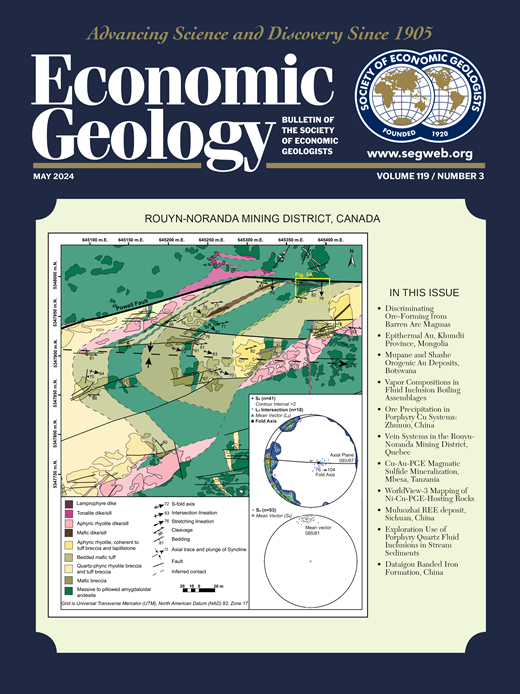Niobium, Critical Metal, and Progeny of the Mantle
IF 5.5
1区 地球科学
Q1 GEOCHEMISTRY & GEOPHYSICS
引用次数: 4
Abstract
Niobium is a critical metal in high demand because of technological advances and the supply risk created by the fact that over 90% of its production is by a single country (Brazil). In this paper, we review the geology of the deposits that are currently being mined and other potentially economic deposits as well as develop models for their genesis. With the exception of the Lovozero deposit (Russia), which is hosted by a layered silica-undersaturated alkaline igneous complex, all the deposits that are currently being mined for niobium are hosted by carbonatites, and most of the deposits with economic potential are also hosted by these rocks. Niobium owes its concentration in carbonatites and alkaline silicate rocks to its highly incompatible nature and the small degree of partial melting of the mantle required to generate the corresponding magmas. The primary control on the concentration of niobium to economic levels in alkaline silicate magmas is fractional crystallization, partly prior to but mainly after emplacement. In the case of silica-undersaturated magmas, the final residue saturates in minerals like eudialyte and loparite to form niobium-rich horizons in the layered complexes that crystallize from these magmas. The final residue, in the case of silica-saturated magmas, crystallizes the pegmatites that are the hosts to the economic niobium mineralization, which commonly takes the form of pyrochlore. In contrast, carbonatitic magmas undergo little to no fractional crystallization prior to emplacement. Moreover, fractional crystallization on emplacement has minimal impact on the concentration of niobium to economic levels. Instead, we propose that the metasomatic interaction of the carbonatitic magmas with their hosts to form rocks like phlogopitite (glimmerite) consumes much of the magma, leaving behind a phoscoritic residue from which pyrochlore crystallizes in amounts sufficient to form economic deposits. Although many niobium deposits display evidence of intense hydrothermal alteration, during which there can be major changes in the niobium mineralogy, the extremely low solubility of niobium in aqueous fluids at elevated temperature precludes significant mobilization and, thus, enrichment of the metal by hydrothermal fluids. However, weathering of carbonatite-hosted niobium deposits leads to supergene enrichment (due largely to the dissolution of the carbonate minerals) that can double the niobium grade and make subeconomic deposits economic. Pyrochlore is the principal niobium mineral in these laterite-hosted deposits, although its composition differs considerably from that in the primary mineralization. This paper evaluates the processes that appear to be responsible for the genesis of niobium ores and provides a framework that we hope will guide future in-depth studies of niobium deposits and lead to more effective strategies for their successful exploration and exploitation.铌,临界金属,和地幔的后代
铌是一种需求旺盛的关键金属,因为技术进步和超过90%的铌产量由一个国家(巴西)生产所带来的供应风险。在本文中,我们回顾了目前正在开采的矿床和其他潜在的经济矿床的地质,并建立了它们的成因模型。除俄罗斯Lovozero矿床为层状硅-欠饱和碱性火成岩杂岩外,目前正在开采的所有铌矿床均为碳酸盐岩赋存,大多数具有经济潜力的矿床也均为碳酸盐岩赋存。铌之所以富集于碳酸盐岩和碱性硅酸盐岩石中,是由于其高度不相容的性质,以及产生相应岩浆所需的地幔部分熔融程度小。碱硅酸盐岩浆中铌浓度达到经济水平的主要控制因素是分馏结晶,分馏结晶部分发生在侵位之前,但主要发生在侵位之后。在硅不饱和的岩浆中,最终的残留物会在像二析出物和矽辉石这样的矿物中饱和,在这些岩浆结晶的层状复合体中形成富铌层。在硅饱和岩浆的情况下,最终的残留物使伟晶岩结晶,伟晶岩是经济铌矿化的主体,通常以焦绿石的形式存在。相比之下,碳酸盐岩岩浆在侵位前几乎没有结晶。此外,在经济水平上,分层结晶对铌浓度的影响最小。相反,我们提出,碳酸盐岩岩浆与其寄主之间的交代相互作用形成了像辉云母(闪辉岩)这样的岩石,消耗了大部分岩浆,留下了一种光斑质的残留物,其中的焦绿石结晶量足以形成经济矿床。尽管许多铌矿床显示出强烈热液蚀变的证据,在此期间铌矿物学可能发生重大变化,但铌在高温水溶液中的极低溶解度阻碍了热液流体的显著动员,从而阻碍了金属的富集。然而,碳酸盐岩型铌矿床的风化作用导致表生富集(主要是由于碳酸盐矿物的溶解),这可以使铌品位加倍,使亚经济矿床具有经济价值。焦绿石是这些红土矿床中主要的铌矿物,尽管其成分与原生矿化中的成分有很大不同。本文评价了对铌矿成因负责的过程,并提供了一个框架,我们希望这将指导未来对铌矿床的深入研究,并为其成功勘探和开发提供更有效的策略。
本文章由计算机程序翻译,如有差异,请以英文原文为准。
求助全文
约1分钟内获得全文
求助全文
来源期刊

Economic Geology
地学-地球化学与地球物理
CiteScore
10.00
自引率
6.90%
发文量
120
审稿时长
6 months
期刊介绍:
The journal, now published semi-quarterly, was first published in 1905 by the Economic Geology Publishing Company (PUBCO), a not-for-profit company established for the purpose of publishing a periodical devoted to economic geology. On the founding of SEG in 1920, a cooperative arrangement between PUBCO and SEG made the journal the official organ of the Society, and PUBCO agreed to carry the Society''s name on the front cover under the heading "Bulletin of the Society of Economic Geologists". PUBCO and SEG continued to operate as cooperating but separate entities until 2001, when the Board of Directors of PUBCO and the Council of SEG, by unanimous consent, approved a formal agreement of merger. The former activities of the PUBCO Board of Directors are now carried out by a Publications Board, a new self-governing unit within SEG.
 求助内容:
求助内容: 应助结果提醒方式:
应助结果提醒方式:


